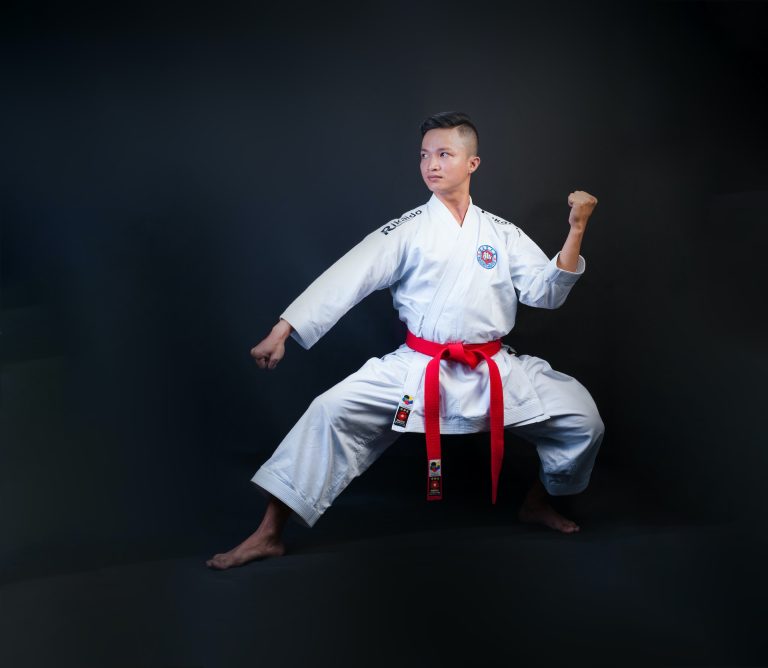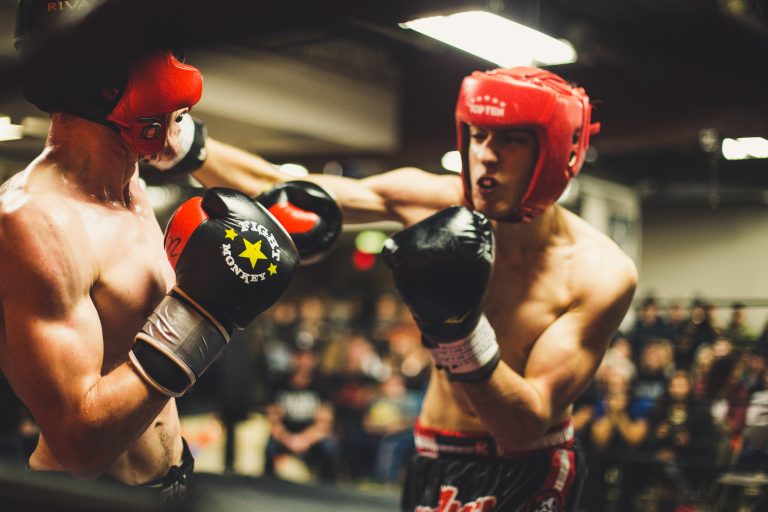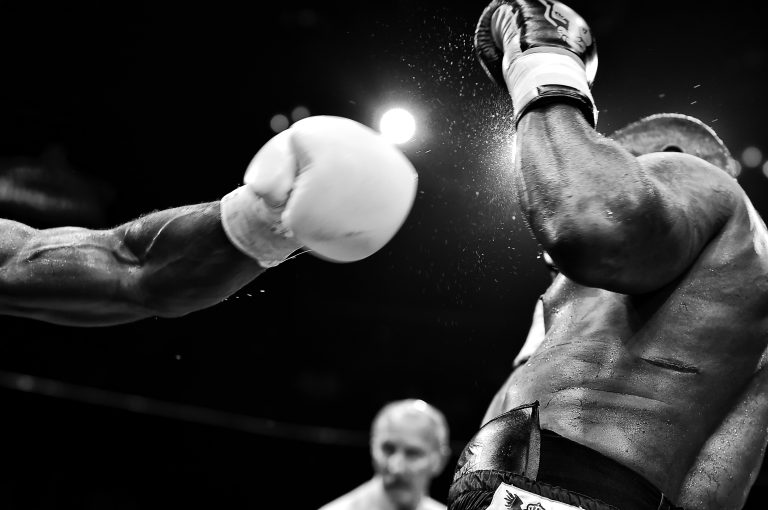Karate Black Belt Test Anforderungen
Der schwarze Gürtel ist das ultimative Ziel eines jeden Karatekas.
Ein Karateka, der einen schwarzen Gürtel tragen möchte, muss sich einem Test unterziehen, der seine technischen Fähigkeiten, seine Fitness, seine mentalen Fähigkeiten und sein Engagement für den Karate-Do bewertet.
Die technischen Fähigkeiten
Ein Karateka, der den schwarzen Gürtel anstrebt, muss über ein tiefes Verständnis aller Techniken des Karates verfügen, einschließlich der Grundtechniken (Kihon), der Kata und der Kumite-Techniken.
Im Test werden die Kenntnisse und Fähigkeiten des Karateka in jedem dieser Bereiche bewertet. Der Karateka muss die Techniken präzise und effektiv ausführen und in der Lage sein, sie in verschiedenen Situationen anzuwenden.
Die Fitness
Ein schwarzer Gürtel muss auch körperlich fit sein. Im Test werden verschiedene körperliche Tests durchgeführt, um die körperliche Fitness des Karateka zu bewerten.
Zu den Tests gehören Ausdauertests wie Laufen und Springen sowie Kraft- und Flexibilitätstests. Der Karateka muss in der Lage sein, seine körperliche Fitness auf einem hohen Niveau zu halten, um den Anforderungen des Karate-Do gerecht zu werden.
Die mentalen Fähigkeiten
Eine wichtige Eigenschaft, die ein Karateka besitzen muss, um den schwarzen Gürtel zu erhalten, sind mentale Fähigkeiten. Dazu gehören Disziplin, Ausdauer, Durchhaltevermögen, Selbstbewusstsein und Respekt.
Der Karateka muss in der Lage sein, seine Emotionen zu kontrollieren und in jeder Situation ruhig und fokussiert zu bleiben. Der Test wird daher auch die mentalen Fähigkeiten des Karateka bewerten.
Das Engagement für den Karate-Do
Ein schwarzer Gürtel ist nicht nur ein Zeichen von technischer Fertigkeit und körperlicher und mentaler Stärke, sondern auch ein Symbol des Engagements für den Karate-Do.
Eine Person, die einen schwarzen Gürtel trägt, hat eine tiefe Verbundenheit mit dem Karate-Do und verfolgt das Ziel, sich ständig zu verbessern und weiterzuentwickeln.
Im Test wird das Engagement des Karateka für den Karate-Do bewertet. Der Karateka muss nachweisen, dass er sich nicht nur auf den Test vorbereitet hat, sondern auch immer danach strebt, seinen Schülern zu helfen, ihr Potential voll auszuschöpfen und ihre Fähigkeiten zu verbessern.
Zusammenfassung
Der schwarze Gürtel ist das ultimative Ziel eines jeden Karatekas. Um den schwarzen Gürtel zu erhalten, muss der Karateka seine technischen Fähigkeiten, seine Fitness, seine mentalen Fähigkeiten und sein Engagement für den Karate-Do beweisen. Der Test ist eine Herausforderung, die nur diejenigen bestehen können, die hart arbeiten und sich auf das Ziel konzentrieren.
Wenn man den schwarzen Gürtel erreicht, ist es eine große Leistung, aber es ist auch nur der Anfang einer endlosen Reise, um das eigene Karate-Do zu verbessern und weiterzuentwickeln.
Karate Black Belt Test Anforderungen: Most Frequently Asked Questions (FAQs)
Karate is a popular martial art that originated in Okinawa, Japan. It is known for its striking techniques, including punches, kicks, and knee strikes, as well as grappling and joint locking techniques. Earning a black belt in karate is a significant achievement that requires years of training and dedication. In this blog post, we will be answering some of the most frequently asked questions about the requirements for the Karate black belt test.
1. What is a Karate black belt?
In Karate, a black belt represents a level of mastery and expertise in the martial art. It is the highest rank a Karate practitioner can achieve, and it signifies a deep understanding of the principles and techniques of Karate. Earning a black belt requires years of dedicated training, and it is a significant achievement for any practitioner.
2. What are the requirements for the Karate black belt test?
The requirements for the Karate black belt test can vary depending on the style of Karate and the specific dojo. However, there are some common requirements that most practitioners must meet in order to test for their black belt. These typically include:
- Minimum age requirement (usually between 16 and 18 years old)
- Minimum amount of training time as a brown belt (usually at least 1 year)
- Proficiency in basic Karate techniques, including strikes, kicks, blocks, and stances
- Knowledge of Kata (pre-arranged forms) and their applications
- Sparring ability and knowledge of Kumite (controlled sparring)
- Understanding of the principles and philosophy of Karate
3. How long does it take to earn a Karate black belt?
The amount of time it takes to earn a Karate black belt can vary greatly depending on the individual, the style of Karate, and the specific dojo. Generally, it takes several years of dedicated training to achieve a black belt. Most practitioners will spend several years as a white belt and then progress through the colored belt ranks (yellow, orange, green, blue, brown) before testing for their black belt.
4. What is tested during the Karate black belt test?
During the Karate black belt test, practitioners are typically tested on their proficiency in basic techniques, their ability to perform Kata and their applications, their sparring ability and knowledge of Kumite, and their understanding of the principles and philosophy of Karate. The exact format of the test can vary depending on the style of Karate and the specific dojo.
5. Can you fail the Karate black belt test?
Yes, it is possible to fail the Karate black belt test. Testing for a black belt is a rigorous process that requires years of training and dedication. Practitioners must demonstrate a high level of proficiency in their techniques and a deep understanding of the principles and philosophy of Karate. If a practitioner is not fully prepared for the test or does not meet the required standards, they may fail the test and be required to retest at a later date.
6. Do you have to break boards during the Karate black belt test?
Breaking boards is a common requirement in Karate tests, including the black belt test. However, not all dojos require board breaks as part of the test. The specific requirements for board breaks can vary depending on the style of Karate and the specific dojo.
7. What happens after you earn your Karate black belt?
Earning a Karate black belt is a significant achievement, but it is not the end of the journey. Practitioners who earn their black belt are considered to have achieved a high level of mastery in Karate, but there is always more to learn and improve upon. After earning a black belt, many practitioners will continue to train and work towards higher ranks, such as second or third degree black belt.
8. What is the significance of the Karate black belt?
The Karate black belt is a symbol of achievement and mastery in the martial art. It represents years of dedicated training, hard work, and perseverance. It is a significant achievement that demonstrates a deep understanding of the principles and techniques of Karate. In addition to the physical aspects of Karate, the black belt also represents a commitment to personal growth, discipline, and respect for oneself and others.
Conclusion
Earning a Karate black belt is a significant achievement that requires years of dedicated training and hard work. The requirements for the Karate black belt test can vary depending on the style of Karate and the specific dojo, but they typically include proficiency in basic techniques, knowledge of Kata, sparring ability, and understanding of the principles and philosophy of Karate. While testing for a black belt can be rigorous and challenging, it is also a deeply rewarding experience that signifies a high level of mastery in the martial art.
Inhaltsverzeichnis






